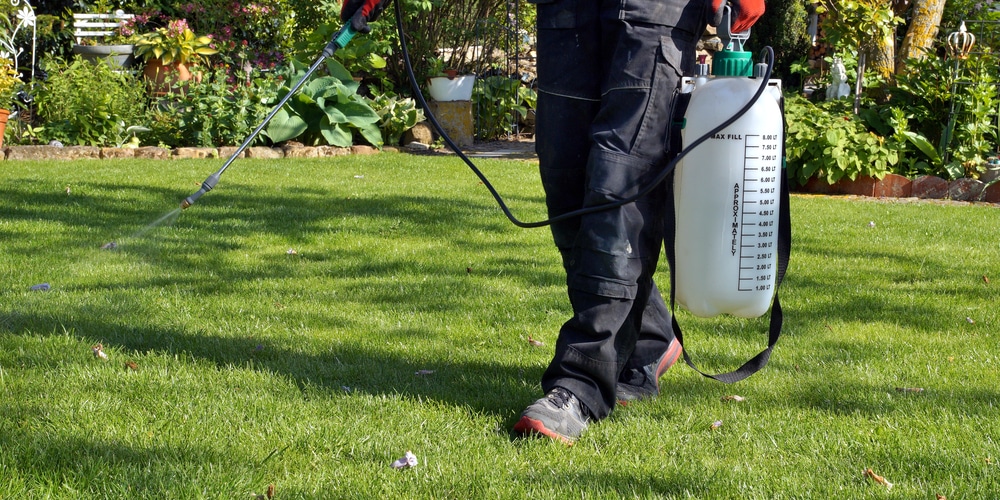Liquid Humate is an amazing soil treatment that fertilizes grasses and plants and improves the soils’ structure. It’s an organic compound that enhances the soil’s nutrient availability and creates vigorous plant growth while promoting soil microbial activity. Here are the pros and cons of using liquid humate in your yard.
Just one application of liquid humate is like spreading high-quality organic compost all over the surface of your lawn. Humate can be used on your lawn but is also beneficial to other plants, shrubs, and trees.
Liquid humate helps improve the health of the soil, which has a knock-on effect on plants’ health. There are various liquid humate products on the market, and they are all very cost-effective compared to applying a compost or sand top dressing. Let’s look at how to use Liquid Humate and the pros and cons of these types of products.
How to use Liquid Humate

Most gardeners use one or two applications of liquid Humate annually to help improve the soil condition. The product is most commonly used on soils that are dense due to heavy clay content. Liquid humate helps improve soil condition and can be used at any time of year. It’s a great way to make your grass thicker.
Many gardeners recommend using liquid humite in the spring or at the beginning of summer before the weather gets too hot. It can also be used in conjunction with seeding a lawn, as humate helps the seeds to germinate.
When Liquid Humate is sprayed onto the ground, it helps release bound nutrients in the soil, which benefit plants. Liquid humite helps to reduce nutrient leaching in sandy soils and improves soil moisture retention.
Liquid Humate products are generally straightforward to use as they need to be spraying onto the soil after seeds have been planted or after cultivation. The product can help to repair damage caused by cultivation and renews the soil’s functionality.
Many gardeners use liquid Humate at the same time as following an existing fertilizer program. This helps to maximize the effectiveness of the fertilizer. Liquid humate can be applied to the soil by using a boom spray, handheld sprayer, or irrigation system, depending on how large an area you have to cover.
Liquid humate is also beneficial for lawns suffering from any disease or fungal infection as it can help strengthen the grass. Humate has been proven to help the grass recover quickly. You may also like to use liquid humate after you’ve aerated your lawn, as this will allow the product to penetrate deeper into the soil. It will help to stimulate microbial activity at a deeper level.
Liquid Humate shouldn’t be applied to your lawn in an undiluted state. Always ensure you read the instructions on the packet and use the product correctly, or you may end up killing your lawn. Water is mixed into the humate to act as a carrier and ensure that your lawn and plants receive proper coverage. Once you’ve diluted the product, it should be applied to your yard within 24 hours; otherwise, it will become less effective.
Liquid Humate Pros and Cons
While there are many benefits of using liquid humate, there are also some disadvantages. Let’s look at liquid humate pros and cons to help you decide whether or not to use the product on your lawn.
The Benefits of Liquid Humate
- The main benefit of liquid humate is that it will improve your soil’s structure, particularly if you have clay-like or sandy soil.
- Liquid humate also helps soil to retain moisture which improves the health of your lawn.
- The product is organic and helps to stimulate soil microbial activity, which means worms and other beneficial insects will naturally aerate your soil.
- It can improve the soil’s carbon levels.
- Increases soil nutrients which help feed plants, grass, and trees.
- Liquid humate helps to reduce leaching, particularly in sandy soil
The Disadvantages of Liquid Humate
- Liquid Humate should always be kept out of the reach of children and pets. It can cause health issues if consumed.
- Be very careful when handling liquid humate as it can cause skin and eye irritation. It’s best to wear gloves when applying the product to your lawn and wash your hands carefully after use.
Conclusion
As you can see, liquid humate is very beneficial to your grass. It can help improve the soil quality, which will allow your lawn to grow healthy and green. This product can also be used on plants, shrubs, and trees in your yard. For best results, apply annually and always follow the manufacturer’s instructions.
There are other types of fertilizer that can be applied, such as Ironite vs Milorganite.
Last update on 2025-06-06 / Affiliate links / Images from Amazon Product Advertising API



